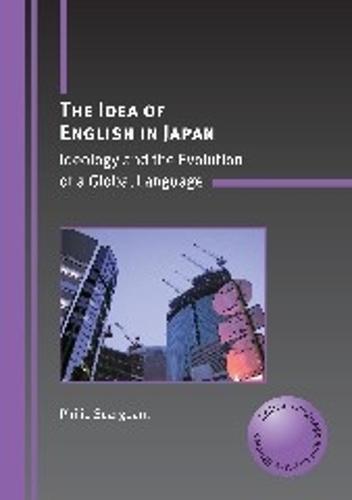Overview
This book examines the ways in which English is conceptualised as a global language in Japan, and considers how the resultant language ideologies - drawn in part from universal discourses; in part from context-specific trends in social history - inform the relationships that people in Japan have towards the language. The book analyses the specific nature of the language's symbolic meaning in Japan, and how this meaning is expressed and negotiated in society. It also discusses how the ideologies of English that exist in Japan might have implications for the more general concept of 'English as a global language'. To this end it considers the question of what constitutes a 'global' language, and how, if at all, a balance can be struck between the universal and the historically-contingent when it comes to formulating a theory of English within the world.
Full Product Details
Author: Philip Seargeant
Publisher: Channel View Publications Ltd
Imprint: Multilingual Matters
Volume: No. 3
Dimensions:
Width: 14.80cm
, Height: 1.10cm
, Length: 21.00cm
Weight: 0.276kg
ISBN: 9781847692016
ISBN 10: 184769201
Pages: 208
Publication Date: 04 August 2009
Audience:
Professional and scholarly
,
Professional & Vocational
Format: Paperback
Publisher's Status: Active
Availability: In Print

This item will be ordered in for you from one of our suppliers. Upon receipt, we will promptly dispatch it out to you. For in store availability, please contact us.
Reviews
The idea of English in Japan is the first book-length treatment of globalization and ideology of English in Japan. Seargeant critically analyzes English both as a language to be communicated in and as a concept to be symbolized and reflected in non-linguistic practices in the society. The book is a must-read not only for scholars of English in Japan but also for anyone who is interested in theorizing English as a global language from linguistic and ideological perspectives. -- Aya Matsuda, Mary Lou Fulton Institute and Graduate School of Education, Arizona State University, USA This is a book that is highly relevant to the global study of applied linguistics. Seargeant's review of the monocentric/polycentric debate is both clear and succinct and at the same time subtle and well-informed. This well-written book draws on a wide-ranging body of literature, which is always germane to the central argument and never a distraction. The Idea of English in Japan is a thoughtful and thought-provoking work that deserves space on the bookshelves of anyone interested in the concept of global English. Alison Stewart, Gakushuin University, Japan, System (2010) By recourse to rich, empirical examples, The Idea of English in Japan effectively engages with postmodern conceptions of global Englishes without succumbing to postmodenlism's more nihilistic excesses. Traditionalists in applied linguistics may chunter that Seargeant's methodologies are unclear; his data too limited for quantitative generalisation or even thick qualitative description; that the book is messy, cluttered, and does not offer anything approaching a linear nalTative or neat conclusion. But this is precisely the point. Seargeant's subject-a globalised language in particular local contexts-is all of these things: fractured, sprawling, circular, self-reflexive, versatile, thought-provoking. His book not only reflects these qualities of English as a global language, but actively embodies them as well. Gareth Price, Duke University in Language Policy (2011) 10:265-267
The idea of English in Japan is the first book-length treatment of globalization and ideology of English in Japan. Seargeant critically analyzes English both as a language to be communicated in and as a concept to be symbolized and reflected in non-linguistic practices in the society. The book is a must-read not only for scholars of English in Japan but also for anyone who is interested in theorizing English as a global language from linguistic and ideological perspectives. Aya Matsuda, Mary Lou Fulton Institute and Graduate School of Education, Arizona State University, USAThis is a book that is highly relevant to the global study of applied linguistics. Seargeant's review of the monocentric/polycentric debate is both clear and succinct and at the same time subtle and well-informed. This well-written book draws on a wide-ranging body of literature, which is always germane to the central argument and never a distraction. The Idea of English in Japan is a thoughtful and thought-provoking work that deserves space on the bookshelves of anyone interested in the concept of global English.Alison Stewart, Gakushuin University, Japan, System (2010)By recourse to rich, empirical examples, The Idea of English in Japan effectively engages with postmodern conceptions of global Englishes without succumbing to postmodenlism's more nihilistic excesses. Traditionalists in applied linguistics may chunter that Seargeant's methodologies are unclear; his data too limited for quantitative generalisation or even thick qualitative description; that the book is messy, cluttered, and does not offer anything approaching a linear nalTative or neat conclusion. But this is precisely the point. Seargeant's subject-a globalised language in particular local contexts-is all of these things: fractured, sprawling, circular, self-reflexive, versatile, thought-provoking. His book not only reflects these qualities of English as a global language, but actively embodies them as well.Gareth Price, Duke University in Language Policy (2011) 10:265-267
Author Information
Philip Seargeant is Senior Lecturer in Applied Linguistics in the Centre for Language and Communication, The Open University. He is author of The Idea of English in Japan (Multilingual Matters, 2009) and Exploring World Englishes (Routledge), and editor of English in Japan in the Era of Globalization (Palgrave Macmillan, 2011) and English in the World: History, Diversity, Change (Routledge, 2012, with Joan Swann).




